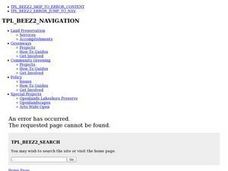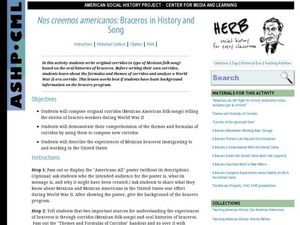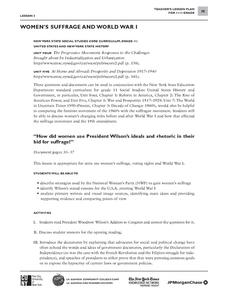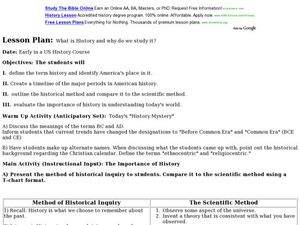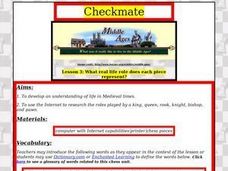Curated OER
United States-Japanese Relations in Post World War II Era
Ninth graders analyze political cartoons and posters relating to the United States and Japan in the period following World War II. They discuss the positive and negative consequences of the United States occupation of Japan.
Curated OER
The Road to World War II
Students research the orgins and early events of World War II using online and off line resources. They conduct an interview with a local World War II veteral and present their findings to the class.
Curated OER
Impact of the End of World War II on Japan
Ninth graders examine and discuss reasons United States occupied Japan after surrender in World War II, view photographs of Japan at end of War and explore how U.S. occupation affected Japan's political, economic, and social systems, and...
Curated OER
World War II Erupts Chapter Review
In this World War II worksheet, students review a chapter as they write 10 vocabulary words that match 10 descriptions, eliminate 4 false sentences, and identify 2 themes from the history of the World War II era.
Curated OER
WACS, WAVES< and SPARS: Women during World War II
Eleventh graders conduct a class discussion on the historical background information of women during World War II. In this American History lesson, 11th graders evaluate what motivated women during this time. Students create a...
Curated OER
Portrayals of Women in World War I
Students explore the contributions of women to the war effort. In this World War I lesson, students examine posters from the era that their instructor has gathered and analyze the message in each of the posters. Students then share their...
Curated OER
The Tale of Genji
Did you know that the world's first novel was written by a woman? Murasaki Shikibu's The Tale of Genji, was published in 1021. Class members research Eastern and Western cultures in the 10th and 11th centuries, view modern adaptations of...
Curated OER
Rosie the Riveeter and Mary the Munitions Worker
Tenth graders study the role that places like the Joliet Arsenal played in how women were view in American society during and after World War II. They interview a person from the World War II era about the job they performed and how...
US House of Representatives
“‘The Negroes’ Temporary Farewell,” Jim Crow and the Exclusion of African Americans from Congress, 1887–1929
Despite some advances made during the Reconstruction Era following the Civil War, the period from 1887 through 1929, African Americans serving in Congress suffered severe setbacks due to Jim Crow Laws and voter suppression. Class members...
Alabama Department of Archives and History
Inside the Wire: Internment of Prisoners of War in Alabama during World War II
Create an open environment of discussion and collaboration with several exercises in a thought-provoking resource. Pupils conduct a gallery walk and lead a discussion before filling out a question sheet and chart during the learning...
Curated OER
Nos Creemos Americanos: Braceros in History and Song
Mexican folk songs offer an authentic look at WWII immigrant workers. This study of the U.S. Bracero Program sets historians up with context information so they can write their own corrido. The class reviews themes and formulas of...
City University of New York
Woman's Suffrage and World War I
How did women use President Wilson's ideals and rhetoric in their bid for suffrage? To answer this essential question, class groups analyze primary written documents and visual images.
National Woman's History Museum
Rosie the Riveter: The Embodiment of the American Woman’s Economic and Social Awakening
Critical events force change. World War II forced a change in perceptions of and attitudes toward women. When thousands of men joined the military American factories were left shorthanded. Young historians investigate how media was used...
National Woman's History Museum
Congresswoman Jeannette Rankin
Political activist, suffragette, pacifist, and the first woman elected to Congress, Jeannette Rankin has been largely ignored in history and history textbooks. Young historians set out to rectify that situation by examining primary...
Benjamin Franklin Tercentenary
Simple Machines, Ben Franklin and the Technology of the 1700s
Benjamin Franklin was an inventor, and he was fascinated by the mechanics of machinery. Using a fun exploration, pupils examine simple machines from the pre-Industrial era. Then, they must identify and build their own using common objects.
Japan Society
Japan in the World Since 1945
What have US-Japanese relations been like since the conclusion of World War II? Why do some commentators identify Japan's postwar years as a subordinate independence? Invite your young historians to research Japan's status in the world...
Curated OER
Artwork of World Cultures
Seventh graders research a culture and art produced by the people of that culture. They create a PowerPoint presentation to explain their findings. Students make a sand painting depicting the art of that era.
Smithsonian Institution
Changing Gender Roles on the Home Front
Many historians discuss how gender roles changed because of World War II, but how did this come to be? An informative resource challenges scholars to do some digging and research the information for themselves. They research how...
Smithsonian Institution
Cuban Missile Crisis
The United States—specifically John F. Kennedy—played a large role during the Cuban Missile Crisis. A history resource poses questions that encourage critical thinking as well as in-depth analysis of images from the time period.
Curated OER
What is History and Why Do We Study It?
Young scholars examine why it is important to study American history. In this American history lesson, students discuss why it is necessary to study history, arrange an outline of American history events in chronological order, and write...
Curated OER
Victorian Homes Lesson
Young scholars investigate British Society in the 19th century by examining Victorian style homes. In this world history lesson, students observe photographs of both rich and poor Victorian homes and discuss the main differences between...
Curated OER
Checkmate: Chess, and the connection to the Middle Ages
Students investigate the different aspects of Medieval Times and the connection to chess. In this world history instructional activity, students complete a chart answering questions about the lifestyles of men and women in the Medieval...
Curated OER
Beowulf: Songs of Ancient Heroes
Introduce your class to epic heroes with these activities for Beowulf. After watching a video clip, taking notes on heroes, and tracking characteristics of heroism throughout Beowulf, class members retell an episode of Beowulf using a...
Curated OER
Consuming History
Students research various foods as well as indigenous plants and animals from different historical eras around the world. They use their research to create a design for theme restaurants.









